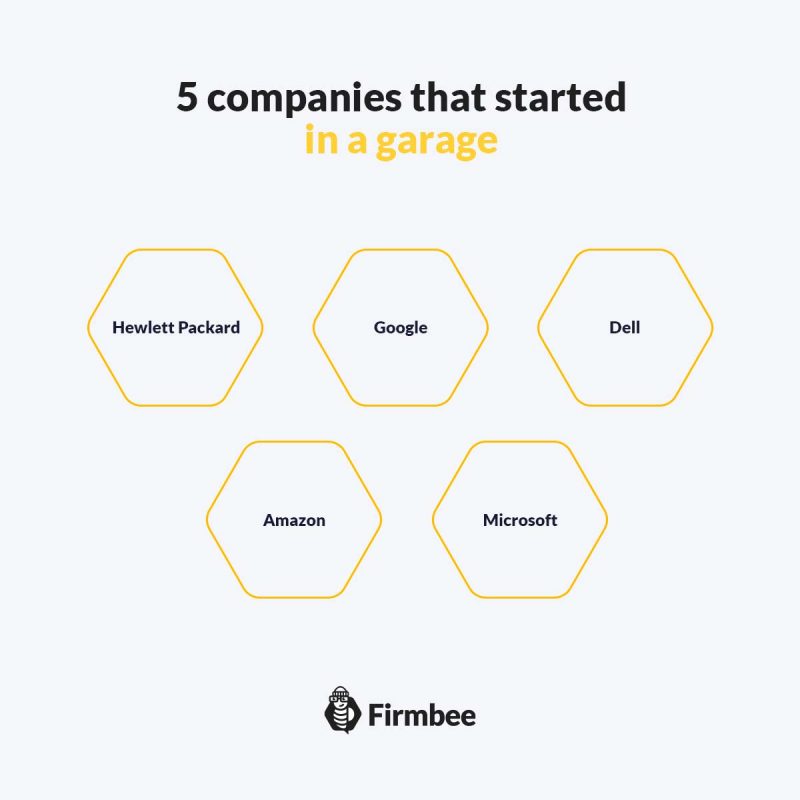Who hasn’t heard of famous startups that came out of garages and today are huge corporations? A garage has even become an archetype, a myth of business success and innovation. What is the garage mindset? Read about 5 companies that started in a garage and find out.
5 incredible companies that started in a garage – table of contents:
- It is a garage thing
- 5 companies that started in a garage
- Why are startups founded in garages?
- Is a garage enough?
- Summary
It is a garage thing
What do people associate a startup with? Some of them will link it to an extraordinary idea, others will relate it to risk and innovation. That’s not the end of the story, though. We all probably associate startups with garage spaces. Several companies like to emphasize their garage origins, as if it was some kind of an ennoblement for them.
It’s even common to talk about the garage mindset that startups should have. The garage is actually an archetype of rising from rags to riches. It’s an inspiration. A garage embodies the spirit of innovation, but after all, it doesn’t have to be real, it can be symbolic.

5 companies that started in a garage
It’s no coincidence that startups are frequently associated with garages. Several tech-giants began to grow their businesses in such spaces:
- Hewlett Packard. It was 1938 when Bill Hewlett and Dave Packard moved to Palo Alto, California. They rented a small garage near the Stanford University campus. Interestingly, in 2007, the house that the garage belonged to was listed on the National Register of Historic Places by the National Park Service. Earlier, in 1989, the aforementioned garage was recognized as the official birthplace of Silicon Valley.
- Google. In 1998, Larry Page and Sergey Brin, two Stanford PhD students, rented a garage from their friends. They soon after came up with the idea for a new search engine. Today, their business is worth 420 billion USD.
- Dell. It was 1984 when 19-year-old Michael Dell dropped out of college and rented a garage off campus in Austin, Texas, and decided to rock the computer business. Currently, Dell Computers is one of the greatest and the biggest computer companies in the world.
- Amazon. Jeff Bezos decided to do a similar thing. In 1994, he began selling books online from his own garage in Washington. Today, he sells almost everything, and is one of the richest people on the planet.
- Microsoft. This tech-giant also started operating in a garage, and that garage was located in Albuquerque, New Mexico. Bill Gates and Paul Allen wrote the first version of BASIC for the Altar computer there, and in 1985 they launched Windows.
Obviously, these are just a few out of many examples of successful companies that started in a garage. However, they give hope to those who are starting their businesses today.
Why are startups founded in garages?
Why exactly is the garage space so frequently chosen by startup companies? Why has the idea of starting a company in a garage taken on a mythic status? In fact, there are several arguments in favor of the garage as a place to start a new business.
First of all, it’s an inspiring space that gives you a lot of freedom to work. It isn’t as rigid as the traditional office since it has no internal walls. Secondly, starting in a garage means financial savings. Renting an elegant office space can weigh heavy on the wallet. Keeping expenses at a low and investing funds, rather than spending, is essential when building a business.
Finally, the garage is a sign of independence as it allows you to rely on yourself only. It is also associated with proximity to home, and therefore safety.

Is the garage enough?
It must be added that the garage is a bit of a myth. There is only a part of the truth in the stories of companies that came out of the garage and rule the new technology market today.
To a large extent, it is just a creation and a well-told story. HP’s founders may have operated in a garage, but at the same time, Bill Hewlett had access to cutting-edge technology at Stanford University. Apple’s founders also worked in a garage, yet were able to use university computer and engineering facilities.
Companies that started in a garage – summary
Operating out of the garage is a great way of saving money. It also gives you a lof of freedom, but it may not always be enough. The founders of the biggest technological companies may have started in their garages, but simultaneously they had access to the latest technologies, which made it easier for them to implement their ideas.
If you like our content, join our busy bees community on Facebook, Twitter, LinkedIn, Instagram, YouTube, Pinterest.
Author: Andy Nichols
A problem solver with 5 different degrees and endless reserves of motivation. This makes him a perfect Business Owner & Manager. When searching for employees and partners, openness and curiosity of the world are qualities he values the most.
Launch your startup:
- What is a startup?
- Pros and cons of creating a startup
- 8 best industries for startups
- Top 5 skills every highly successful startup founder needs
- How to create a startup? 7 simple and easy steps
- 6 essential startup development stages
- How to create a startup growth strategy?
- General startup statistics you need to know
- Startup vs. corporate job. Which is right for you?
- 5 incredible companies that started in a garage
- How to find a business idea?
- How to check if your startup idea already exists?
- How to name a startup? Useful tips and strategies
- How to gain business knowledge quickly? 5 best practices
- Why do startups fail? 6 startup ideas you should avoid
- 5 weird business ideas that made millions
- Top 6 most profitable small businesses
- 7 questions to determine if your business idea is worth pursuing
- What is a buyer persona? 5 benefits of creating a buyer persona
- How to validate your business idea? 3 easy steps
- Should you follow your passion? The importance of passion in business
- What is market reseach and why is it important?
- Using social media in business
- What to do when you have too many business ideas?
- How to write a good problem statement for your startup?
- How to test your business idea for real?
- How to create a prototype for a product?
- How to build an MVP?
- How to use surveys for testing your business idea?
- 10 useful tools to validate your business idea
- What is a business plan? 4 types of business plans
- What should be included in a business plan?
- What should a product description include?
- Competitor analysis
- Marketing strategy
- Traditional business plan vs. lean startup plan
- Implementation plan. What is it and how to create it?
- Everything you need to know about patents
- Financial management for startups
- What permits and licenses does my startup need?
- What is the average startup founder salary?
- 4 startup taxes you need to pay
- Which legal structure is best for your business?
- Startup costs. How much money will you need?
- Protection of intellectual property in a startup
- Family funding vs. self-funding
- What is a shareholders’ agreement?
- What should a financial section of a business plan include?


















